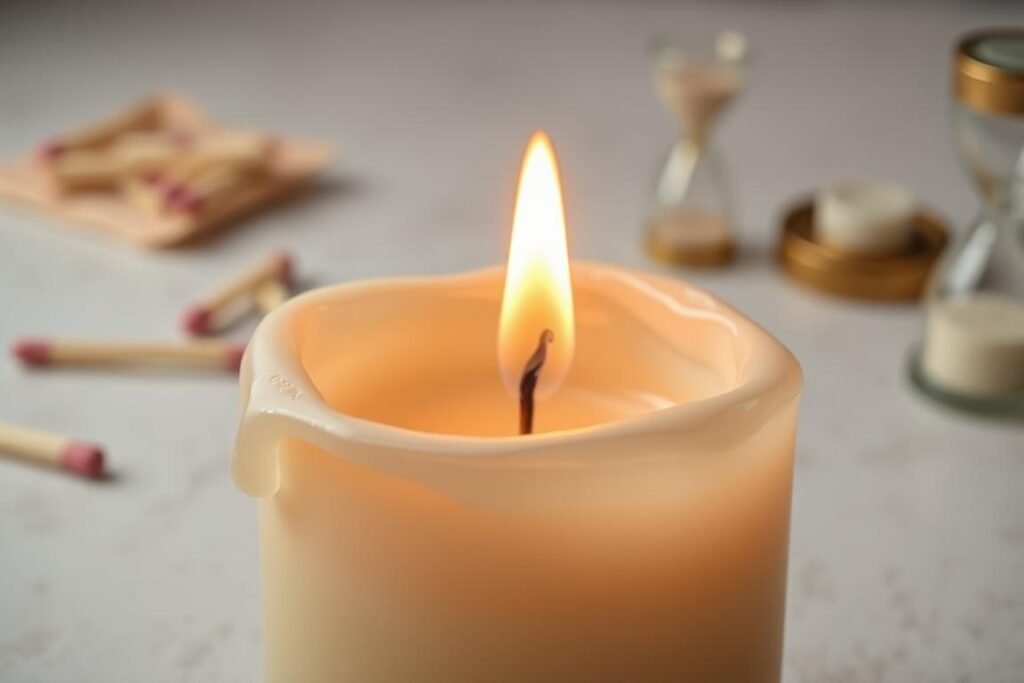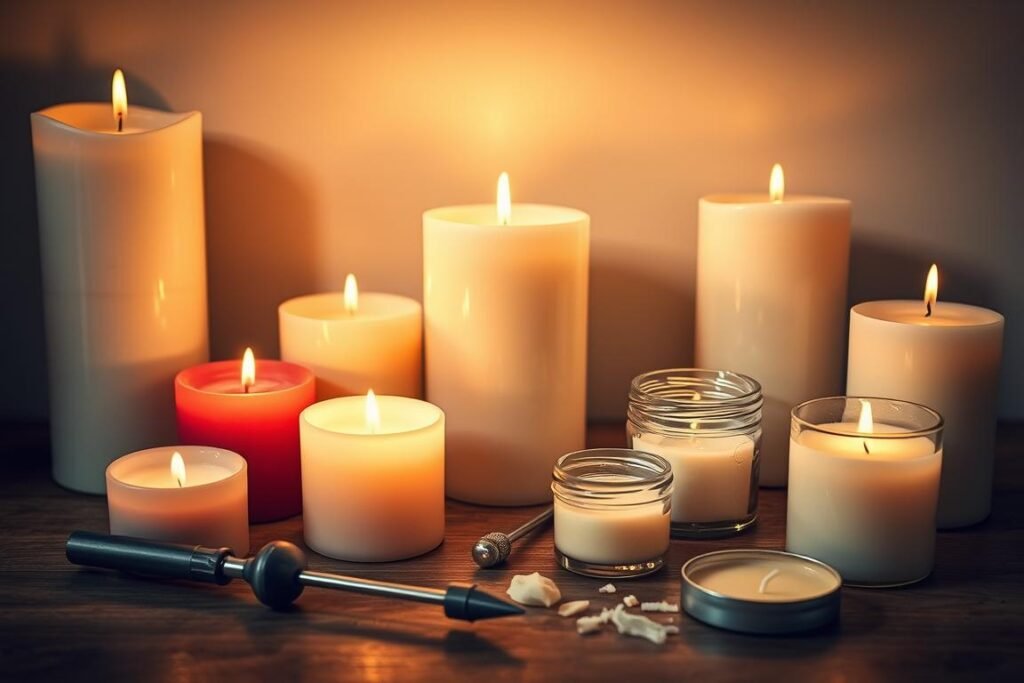Candles can make any space cozy and inviting. But, there’s a time when it’s not safe to keep burning them. Knowing when to stop is key for safety and enjoying your decor.
Look out for changes in smell, uneven wax, and too much soot. These signs mean it’s time to say goodbye to your candle. By watching for these signs and taking care of your candle, you can enjoy it safely.
Key Takeaways
- Look for changes in fragrance, uneven wax pooling, and excessive soot as signs it’s time to retire a candle.
- Limit burn time to 2-4 hours per session and trim wicks to 1/4 inch before lighting to prevent hazards.
- Discard candles with only 1/2 inch of wax remaining to avoid overheating and safety risks.
- Proper storage and regular inspection can extend the lifespan of your favorite candles.
- Explore eco-friendly disposal methods or repurpose leftover wax when your candle is finally spent.
By being informed and caring for your candles, you can enjoy them safely. The perfect candle adds warmth and beauty without risking your safety or the candle’s life.
Signs It’s Time to Stop Burning Your Candle
As a candle lover, I know how great they make our homes feel. But, knowing when to stop burning a candle is key. This way, we can keep our candle use safe and fun.
Noticeable Fragrance Changes
Candles usually keep their scent strong for 6 to 12 months after first use. If the smell weakens or changes a lot, it’s almost time to stop using it. Burning it too long can make the smell bad or weak.
Uneven Wax Pooling
It’s important to burn candles right to avoid uneven wax. If the wax doesn’t melt evenly, it’s time to stop. Uneven wax can burn poorly and be dangerous.
Excessive Soot Production
As a candle gets old, it might make more soot. This can happen if the wick is too long or if you burn it too long. Too much soot can make the wax look bad and leave residue.
Watching for these signs helps us use candles safely and enjoy them more. Remember, knowing when to stop using a candle is important. It helps us get the most out of our favorite candles.
Safety Considerations for Candle Use
When using candles, safety is key, especially in small spaces. [https://nationalgeneral.com/about-us/news-and-blog/candle-safety-tips] Keep them away from things that can catch fire like silk, cotton, and linen. Always place candles on flat, heat-resistant surfaces to avoid accidents.
It’s important to watch candles closely. Never leave them burning alone. Make sure kids and pets can’t get to them. In small areas, good air flow and avoiding drafts help keep things safe.
Utilizing Candles in Small Spaces
In small places like bathrooms or bedrooms, be extra careful. Make sure the air is fresh to stop candles from burning too fast or unevenly. This can prevent drips or soot. Don’t put candles near curtains, furniture, or other things that can catch fire.
Importance of Supervision
Watching candles closely is very important. The National Candle Association says 85% of candle fires could be stopped with just three simple rules. Never leave a candle alone, keep them away from things that can burn, and use strong holders.
“Candles should not burn for longer than four hours and should cool for at least two hours before relighting.”
By focusing on candle safety, you can enjoy candles without risking your home or family. Candle precautions and candle regulations are there to protect us. It’s important to follow them carefully.
| Candle Safety Tip | Recommendation |
|---|---|
| Wick Trimming | Always trim the wick to 1/4 inch before lighting to prevent uneven burning, dripping, or flaring. |
| Burn Time | Burn candles for no more than 4 hours at a time and allow them to cool for at least 2 hours before relighting. |
| Wax Remaining | Discontinue use when 1 inch of wax remains to avoid potential hazards. |
By following these candle safety tips, you can enjoy candles safely. Remember, using candles wisely and following precautions are key for a safe and fun experience.
How Long Should You Burn a Candle?
As a candle lover, I’ve found that knowing the right burn times is key. It keeps my candles lasting longer and burning better. By following some simple rules and taking care of my candles, I get the most out of them.
General Guidelines for Burn Time
The best burn time for candles is 2-4 hours at a time. For the first burn, let it go for at least an hour for every inch of the container. This helps the wax melt evenly, avoiding the “tunneling” problem.
The 4-Hour Rule
Never burn a candle for more than 4 hours straight. Burning it too long can make the wick unstable. This leads to more smoke and soot. Always turn off the flame and let it cool for 2 hours before lighting it again.
By sticking to these easy rules and taking care of your candles, you’ll enjoy them for a long time. Happy candle burning!

| Candle Size | Recommended Burn Time |
|---|---|
| 4-6 ounces | Maximum 2 hours |
| Larger candles | Up to 4 hours |
“The first burn is crucial to prevent tunneling, which occurs when the wax doesn’t melt evenly, leaving a ring of wax at the candle’s center.”
The Importance of Caring for Your Candles
Proper candle care is key to making your candles last longer and safe to use. By following a few simple tips, you can get more out of your favorite candles.
Proper Storage Techniques
Store your candles in a cool, dark, and dry spot. Keep them in their original packaging to prevent damage. Avoid direct sunlight or heat, as it can melt the wax and fade the scent.
Regular Inspection
Check your candles often for signs of wear. Look for changes in wax texture, color, or scent. This means the candle is almost done. Trim the wick to a quarter-inch before each use to avoid smoking and uneven burning. Clean the container to keep the burn consistent.
By following these candle maintenance practices, you can make your candles last longer. This ensures safe, candle precautions every time you enjoy them.

“Caring for your candles is the key to unlocking their full potential and enjoying their beauty and fragrance to the fullest.”
What to Do When Your Candle is Done
When your candle is almost gone, it’s time to think about what to do with the leftovers. Don’t just throw away the container. There are many eco-friendly and useful ways to reuse your candle’s remains.
Repurposing Leftover Wax
After your candle burns down, you might have wax left in the container. This wax can be turned into new candles or wax melts. Just take out the wick, melt the wax, and pour it into molds for a new candle.
This not only gets rid of candle remnants, but also lets you make something new with your favorite smells and colors.
Eco-Friendly Disposal Methods
When it’s time to say goodbye to your candle, think about the planet. First, take out any wax left in the container. Glass or metal containers can usually be recycled. Check your local recycling rules.
Wax from natural sources like soy or beeswax can be composted. Always follow your area’s candle disposal guidelines to dispose of your candle’s remains responsibly.
By reusing leftover wax and disposing of candle remnants properly, you can reduce waste. You can also give your favorite candles a second chance. With a bit of creativity and care, you can be kind to the environment while enjoying your candles.
Understanding Candle Materials and Their Lifespan
I love candles and have learned that the materials used matter a lot. Waxes like paraffin, beeswax, and soy wax each have special qualities. These qualities affect how a candle burns and lasts.
Different Wax Types and Their Burn Characteristics
Paraffin wax comes from petroleum and gives strong scents. But, it’s not good for the environment. Beeswax, on the other hand, burns slowly and doesn’t hold scent as well.
Plant-based waxes like soy and coconut wax burn clean and slow. They also spread scents well.
Impacts of Added Scents and Dyes
Scents and dyes can change how a candle lasts and smells. Natural oils and dyes work better than synthetic ones. They are more friendly to the wax and wick.
Knowing about these differences helps me choose and care for candles. This way, I get the best smell, burn, and life from my candles.
FAQ
When should you not burn a candle anymore?
What are the signs it’s time to stop burning your candle?
What safety considerations should I keep in mind when using candles?
How long should you burn a candle?
How should I care for my candles?
What should I do when my candle is done?
How do different candle materials affect their lifespan and performance?
Source Links
- https://brooklyncandlestudio.com/blogs/thecandlelife/143335751-4-ways-youre-burning-candles-all-wrong?srsltid=AfmBOorbR6vHNikJohxVLbJ26E8GMexvetZcfyiakslQT8UDmGlZWR8O – 4 Ways You’re Burning Candles All Wrong
- https://www.frostbeardstudio.com/blogs/news/telltale-signs-it-s-time-to-replace-your-favorite-candle?srsltid=AfmBOooou1rZ0xfapIOn9N6pL4y4C1LrUaP01Pkv_OZ7OD9_qcWrqPFa – Telltale Signs It’s Time To Replace Your Favorite Candle
- https://news.ycombinator.com/item?id=34427295 – A candle produces roughly the same amount of energy as a resting human
- https://thediyplaybook.com/my-favorite-candles/ – Common Candle Burning Mistakes You Might Be Making
- https://shoparchipelago.com/blogs/blog/how-long-should-you-keep-your-candle-burning – How Long Should You Keep Your Candle Burning?
- https://candlebiscandleco.com/pages/warning-and-disclosure – Candle Care & Safe Burning Instructions
- https://roomfortuesday.com/candle-selection-candle-care-tips/ – Candle Selection & Candle Care Tips – Room for Tuesday
- https://nationalgeneral.com/about-us/news-and-blog/candle-safety-tips – National General
- https://brooklyncandlestudio.com/blogs/thecandlelife/143335751-4-ways-youre-burning-candles-all-wrong?srsltid=AfmBOopjViIv8D21CEbEohyj_cqLTFY3xwUnXa52snZWNHp47SB_W5sO – 4 Ways You’re Burning Candles All Wrong
- https://beeinspiredgoods.com/pages/candle-burning?srsltid=AfmBOorb26Lmm9MRtnUAjrxp6ly9r_pnI15NXM7f3a1CoDZNA4AjrMQ4 – Candle Burning | Bee Inspired
- https://ajabotanicals.com/pages/how-to-care-for-your-aja-botanicals-candle?srsltid=AfmBOoo8Fszj64Inck0-P2ly6bfd7xV_nDGkt-HO6s7SfAv6Vli5NGPJ – Simple candle care: why is it so important?
- https://stylemeetsstory.com/how-to-properly-burn-a-candle/ – Here’s How to Burn a Candle, The Right Way – Style Meets Story
- https://fernweheditions.com/pages/how-to-care-for-and-extend-the-life-of-your-candles – Candle Care 101: How to Care for Your Candles and Avoid Tunneling
- https://houseofaroma.in/candle-care-guide/ – Essential Candle Care Guide for Longevity and Safety
- https://upcandledesign.com/blogs/mindful-artistry/finding-the-right-burn-time-candle-burning-tips-and-guidelines?srsltid=AfmBOopwumuQjlKHrAPjW8kokbmJoyH–SDzL6XZxa1tbTBS4RJcHtMw – Finding the Right Burn Time: Candle Burning Tips and Guidelines


